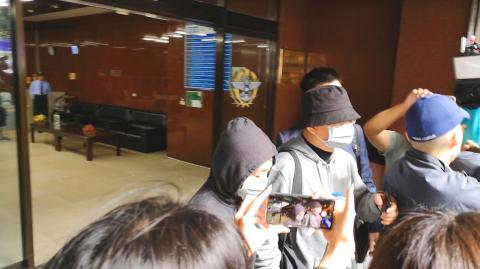The Taipei District Prosecutors’ Office yesterday said that it does not rule out the possibility of requesting evidence from the Australian Attorney-General’s Department to corroborate allegations made by self-confessed Chinese spy William Wang Liqiang (王立強).
Taipei and Canberra do not have a mutual judicial assistance agreement, but the office can request the information on a case-by-case basis.
The office yesterday questioned China Innovation Investment Ltd (中國創新投資) executive director Xiang Xin (向心) and his wife, acting director Kung Ching (龔青), for more than two hours, reasserting that it has jurisdiction over the case.

Photo: Huang Chieh, Taipei Times
After questioning on Tuesday, the couple was barred from leaving the nation over an alleged breach of the National Security Act (國家安全法).
Xiang and Kung were detained on Sunday as they prepared to board a flight at Taiwan Taoyuan International Airport, after Wang claimed he was recruited by Xiang to take part in espionage operations in Hong Kong and Taiwan.
Wang said that before the handover of Hong Kong from Britain, Xiang received orders from high-ranking officials in the Chinese military to acquire two listed companies in Hong Kong, which were to serve as top intelligence apparatuses in Hong Kong and Taiwan under the guise of the integration of civil-military development and communications.
Wang said that in 2014, he started working at China Innovation Investment and was asked by Xiang to teach Kung painting, adding that after gaining Xiang’s trust, he played the role of “middleman” in espionage operations.
China Innovation Investment on Sunday denied Wang’s allegations, saying that it never hired him.
Xiang denied Wang’s allegations, saying that he did not recognize Wang, but that he travels to Taiwan nearly every month and often meets with businesspeople in search of investment opportunities.
Xiang admitted to spending more than NT$100 million (US$3.28 million) a few years ago to purchase two units in the Kingdom of Global View (冠德遠見) apartment complex in Taipei’s Xinyi District (信義).
As the apartments are not registered in Xiang’s or Kung’s name, prosecutors said they followed the flow of money to verify the claim.
Asked about having jurisdiction over the case, the Taipei District Prosecutors’ Office yesterday said that there is no doubt that it has jurisdiction, because Xiang and Kung’s operations, place of residence and purchased real estate are all in Taipei.
Citing Article 4 of the Code of Criminal Procedure (刑事訴訟法) — which states that “a district court has jurisdiction over the first instance of a criminal case, but the high court has jurisdiction over the first instance of an offense against internal security or external security of the state, and interference with relations with other states” — the office said that it has jurisdiction over a case involving alleged breaches of the act.
The case of Chinese People’s Liberation Army intelligence officer Zhen Xiaojiang (鎮小江), who was convicted in 2015 of contravening the act, is an example of its jurisdiction, the office said.
Due to the nature of the investigation, it would not be publicizing information about the case, it said.
The Chinese-language Apple Daily yesterday reported that the couple could have used the three properties in Taipei as bases for infiltrating Taiwan.
Additional reporting by CNA

MAKING WAVES: China’s maritime militia could become a nontraditional threat in war, clogging up shipping lanes to prevent US or Japanese intervention, a report said About 1,900 Chinese ships flying flags of convenience and fishing vessels that participated in China’s military exercises around Taiwan last month and in January last year have been listed for monitoring, Coast Guard Administration (CGA) Deputy Director-General Hsieh Ching-chin (謝慶欽) said yesterday. Following amendments to the Commercial Port Act (商港法) and the Law of Ships (船舶法) last month, the CGA can designate possible berthing areas or deny ports of call for vessels suspected of loitering around areas where undersea cables can be accessed, Oceans Affairs Council Minister Kuan Bi-ling (管碧玲) said. The list of suspected ships, originally 300, had risen to about

DAREDEVIL: Honnold said it had always been a dream of his to climb Taipei 101, while a Netflix producer said the skyscraper was ‘a real icon of this country’ US climber Alex Honnold yesterday took on Taiwan’s tallest building, becoming the first person to scale Taipei 101 without a rope, harness or safety net. Hundreds of spectators gathered at the base of the 101-story skyscraper to watch Honnold, 40, embark on his daredevil feat, which was also broadcast live on Netflix. Dressed in a red T-shirt and yellow custom-made climbing shoes, Honnold swiftly moved up the southeast face of the glass and steel building. At one point, he stepped onto a platform midway up to wave down at fans and onlookers who were taking photos. People watching from inside

Japan’s strategic alliance with the US would collapse if Tokyo were to turn away from a conflict in Taiwan, Japanese Prime Minister Sanae Takaichi said yesterday, but distanced herself from previous comments that suggested a possible military response in such an event. Takaichi expressed her latest views on a nationally broadcast TV program late on Monday, where an opposition party leader criticized her for igniting tensions with China with the earlier remarks. Ties between Japan and China have sunk to the worst level in years after Takaichi said in November that a hypothetical Chinese attack on Taiwan could bring about a Japanese

The WHO ignored early COVID-19 warnings from Taiwan, US Deputy Secretary of Health and Human Services Jim O’Neill said on Friday, as part of justification for Washington withdrawing from the global health body. US Secretary of State Marco Rubio on Thursday said that the US was pulling out of the UN agency, as it failed to fulfill its responsibilities during the COVID-19 pandemic. The WHO “ignored early COVID warnings from Taiwan in 2019 by pretending Taiwan did not exist, O’Neill wrote on X on Friday, Taiwan time. “It ignored rigorous science and promoted lockdowns.” The US will “continue international coordination on infectious